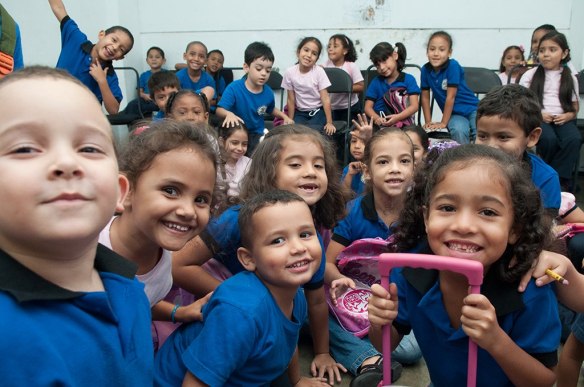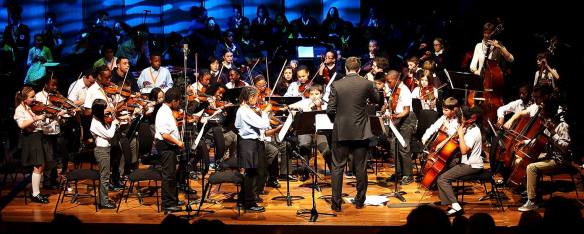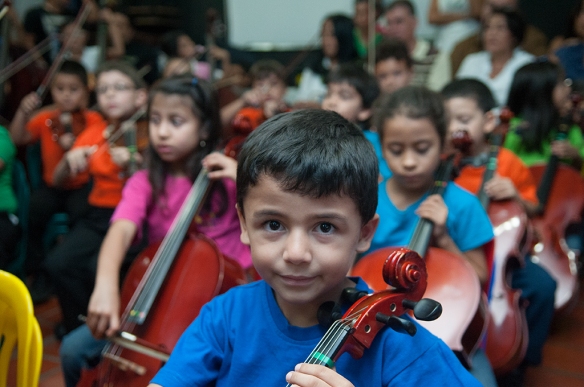
3-year-olds take their first music lessons in a nucleo in Guarenas, 20 miles East of Caracas. Photo: Reynaldo Trombetta (January 2013)
Disclaimer: The opinions expressed in this post are my own, and do not necessarily reflect the views of Sistema England or the programmes it supports.
Those of us that have witnessed how music can light up passion and self-confidence in a child sometimes find it difficult to qualify, quantify and explain this phenomenon. We know it works, yes… we just sometimes don’t have the tools or the expertise to explain it to other people. That’s why it is so important to welcome academics and researchers into the Sistema movement. We need to gather measurable evidence that this work is worth supporting. And that is why initially I was excited to learn that Geoff Baker was studying El Sistema. In four decades, the Venezuelans have not produced a solid-enough body of evidence of the programme’s impact, so I thought that an academic from the University of London could do that. Unfortunately, I was wrong.
The multiple instances of unsubstantiated allegations, hearsay, gossip and cultural misunderstandings in Baker’s book seriously compromise its integrity as a piece of relevant academic research. Instead of offering constructive criticism and ways forward to improve El Sistema, the author seems convinced that the only option is to dismantle the nucleos, orchestras and choirs, and send all the kids home.
Mr Baker appears to collect every single observation, accusation or rumour that could cast a shadow on El Sistema, while discarding anything that could be considered positive. The best example of this is how he quotes Chefi Borzacchini’s The Miracle of Music dozens upon dozens of times, mostly to criticise that book for its lack of quantitative research on El Sistema… but then, when Baker discusses the demographics of the programme, he conveniently ignores the 2007 survey cited by Borzacchini, that found that among 180 families from 15 nucleos in Caracas, Bolivar, Lara, Merida, Miranda, Tachira, Sucre and Zulia, 11% were middle class, 36% lived in poverty and 53% lived in extreme poverty.
Instead of presenting socio-demographic data, Baker recalls seeing Sistema kids with BlackBerry phones and Facebook accounts, suggesting that this is proof enough that they are middle-class. The truth is that in almost any rancho (shack) in the Venezuelan barrios (slums), you will find smartphones, computers and high-definition TVs, but none of that means that the people living there are even close to being middle-class. Understandably, Baker didn’t have the resources to conduct a survey in a statistically-significant number of nucleos across the country. So what did he do? He asked around in the one nucleo where he spent a substantial amount of time in, and maybe in a handful of other nucleos that he appears to have visited. Did he speak to people that had conducted surveys throughout El Sistema? Apparently not. He mostly spoke to teachers in those few nucleos, whose perception of the overall reach and diversity of El Sistema was based on their own limited local experience.
If Baker had visited the Los Chorros nucleo, which engages with 1,000 children and young people most of whom are brought in buses from Petare (one of the largest slums in Latin America), or if he had been to the “12 de Marzo” school in the village of El Soroco, where many of the kids worked classifying waste in a rubbish landfill, he would have had a different perception. Which of these nucleos is more representative of El Sistema? That’s up for debate, but until someone presents a survey that contradicts the one quoted by Borzacchini, I have no reason to believe Baker’s assertions that El Sistema works with mostly middle-class kids.
To an informed reader, the flaws in Baker’s research are evident. For example, he mentions El Sistema’s programme in prisons, which aims to humanise Venezuela’s penitentiaries. Baker ironizes that soon after a 2011 concert by inmates, and again in the next two years, there were outbreaks of violence in several prisons, so this should be proof that the programme has been unsuccessful, right? What he fails to mention is that none of the prisons that had these riots (El Rodeo in 2011, Yare in 2012 and Uribana in 2013) were part of El Sistema’s programme. Actually, Venezuelan NGOs that have been fiercely critical of the government’s management of penitentiaries, have described El Sistema’s prison programme as “excellent work” and have called for it to be expended as it only reaches 2.5% of inmates. But Baker did not speak to these NGOs. He also did not speak to any of the men and women that took part in the programme. He just saw an opportunity to attack El Sistema and he took it.
There are a good number of people with whom, it seems, Baker did not speak. The list would include the children in the programme and, most importantly, their parents, who could have explained why they queue outside nucleos, desperate to enrol their kids. Maybe Baker would have learnt something about the realities of growing up in a barrio, and what life without El Sistema would be like. It seems he also didn’t speak to any of the participants in the programmes for children with special needs or terminal illnesses, or with their families, who probably would have had something to say over whether music is improving the lives of their kids.
Clearly convinced that El Sistema is subjecting Venezuelans to cultural imperialism through classical music, Baker probably didn’t speak to any of the people involved in the programmes that focus on folk music, salsa, jazz, rock or other genres. Apparently, he also didn’t speak to anyone willing to explain to him that in Venezuela we believe that our cultural identity is composed of three threads: Amerindian, African and European; so no, we don’t see Western classical music as an imposition from the evil white man because that white man assimilated into our society centuries ago [that’s why on the stage of the Teresa Carreño Theatre, the most important arts venue in the country, you are as likely to see an orchestra playing a Mozart concerto or a Tchaikovsky ballet, as a concert of llanera folk music, a descarga of Afro-Venezuelan drumming or even a group of shamans from our indigenous peoples sharing their sacred songs, including one that uses a violin-like instrument called sekeseke, which would most probably horrify Mr Baker, I am sure.]
Baker did speak to anybody and everybody with an axe to grind. And anonymously, of course. The book contains 322 pages of anonymous accusations about very serious issues including sexual abuse, bullying and corruption. Baker admittedly never presents a shred of evidence, but he still slings the mud to see what will stick. Let me be clear: If there have been crimes committed within El Sistema, they must be investigated and the perpetrators brought to justice. But with his flawed research Baker seems more interested in attacking the programme than in obtaining justice for any victim.
Is El Sistema perfect? Of course not. But most of the problems that any critic would find in the programme are endemic to Venezuela and not specific to El Sistema. As we Venezuelans often say: We are not Swiss. It is a difficult country to live in, with a reality that is alien to most people in Europe or North America. Last year, a daily average of 67 people were murdered in Venezuela, and less than 10% of those homicides led to an arrest. 2013 closed with an inflation of 57.2%, the second highest unemployment rate in Latin America and excruciating shortages of food and medicines. Yet, in the midst of this chaos, El Sistema continues giving half a million kids the opportunity to experience discipline, structure, joy and support, while discovering the value of striving for excellence.
How you engage with children in a social project, and how you teach music in Caracas, is not how you would do it in London or Boston or even in Bogota. Knowing this, there are still many things that I believe can be taken from El Sistema and adapted to other countries and societies. Some of them: The belief that all children deserve access to music; that every child can make music if he finds an inspiring teacher; that kids are willing to work hard and achieve excellence; and that playing in an orchestra or singing in a choir does positively transform children’s lives. Those involved in Sistema-inspired programmes all over the world will decide for themselves what they take from the Venezuelans.
Baker has said that he travelled to Caracas with the best of intentions, enthralled by the SBYO’s performance at the 2007 Proms. But before focusing on El Sistema he had already authored Imposing Harmony: Music and Society in Colonial Cuzco, a book about how Spanish missionaries used European classical music as a mechanism of colonialization and control, so I am guessing that he was never as enthusiastic as he claims about the young Venezuelans playing Shostakovich. In any case, and assuming his good will, my belief is that the limitations of his research and his own prejudices left him like a blind man grasping the elephant’s tail, convinced that the elephant was a piece of rope.

